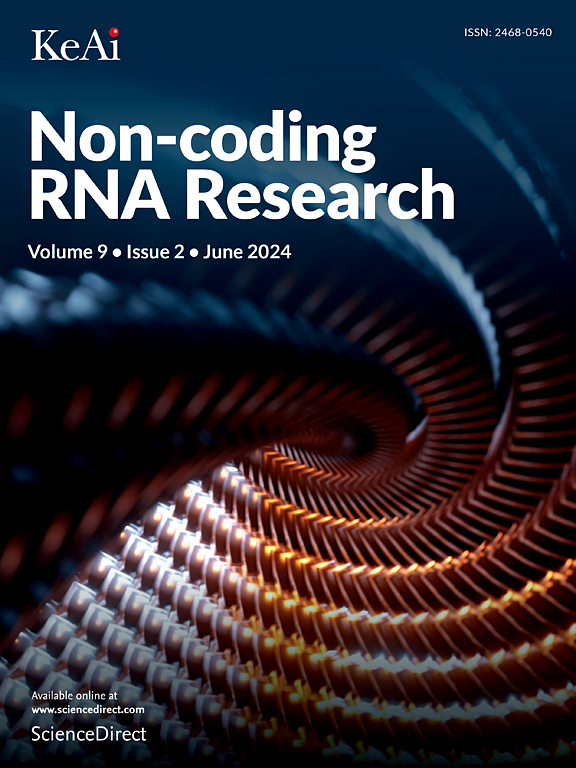Research progress on the interaction between intestinal flora and microRNA in pelvic inflammatory diseases
IF 5.9
3区 生物学
Q1 BIOCHEMISTRY & MOLECULAR BIOLOGY
引用次数: 0
Abstract
Pelvic inflammatory disease (PID) is a common infectious disease of the female upper reproductive tract, and its pathological basis is immune inflammatory response. The imbalance of gut microflora (GM) may lead to the development of inflammatory process. A large number of studies have shown that fecal microbiota transplantation, probiotics, bacteria, prebiotics, and dietary intervention may play a potential role in remodeling GM and treating diseases. MicroRNAs (miRNAs) are involved in cell development, proliferation, apoptosis and other physiological processes. In addition, they play an important role in the inflammatory process, participating in the regulation of proinflammatory and anti-inflammatory pathways. Differences in miRNA profiles may be PID diagnostic tools and serve as prognostic markers of the disease. The relationship between miRNA and GM has not been fully elucidated. Recent studies have shown the role of miRNA in the regulation and induction of GM dysbiosis. In turn, microbiota can regulate the expression of miRNA and improve the immune status of the body. Therefore, this review aims to describe the interaction between GM and miRNA in PID, and to find potential precise targeted therapy for PID.
盆腔炎中肠道菌群与microRNA相互作用的研究进展
盆腔炎(PID)是女性上生殖道常见的感染性疾病,其病理基础是免疫炎症反应。肠道菌群失衡可能导致炎症过程的发生。大量研究表明,粪便微生物群移植、益生菌、细菌、益生元和饮食干预可能在转基因重塑和治疗疾病中发挥潜在作用。MicroRNAs (miRNAs)参与细胞发育、增殖、凋亡等生理过程。此外,它们在炎症过程中发挥重要作用,参与促炎和抗炎途径的调节。miRNA谱的差异可能是PID的诊断工具,并作为疾病的预后标志物。miRNA与GM之间的关系尚未完全阐明。最近的研究表明,miRNA在调控和诱导转基因生态失调中的作用。反过来,微生物群可以调节miRNA的表达,改善机体的免疫状态。因此,本文旨在描述GM和miRNA在PID中的相互作用,并寻找潜在的PID精确靶向治疗方法。
本文章由计算机程序翻译,如有差异,请以英文原文为准。
求助全文
约1分钟内获得全文
求助全文
来源期刊

Non-coding RNA Research
Medicine-Biochemistry (medical)
CiteScore
7.70
自引率
6.00%
发文量
39
审稿时长
49 days
期刊介绍:
Non-coding RNA Research aims to publish high quality research and review articles on the mechanistic role of non-coding RNAs in all human diseases. This interdisciplinary journal will welcome research dealing with all aspects of non-coding RNAs-their biogenesis, regulation and role in disease progression. The focus of this journal will be to publish translational studies as well as well-designed basic studies with translational and clinical implications. The non-coding RNAs of particular interest will be microRNAs (miRNAs), small interfering RNAs (siRNAs), small nucleolar RNAs (snoRNAs), U-RNAs/small nuclear RNAs (snRNAs), exosomal/extracellular RNAs (exRNAs), Piwi-interacting RNAs (piRNAs) and long non-coding RNAs. Topics of interest will include, but not limited to: -Regulation of non-coding RNAs -Targets and regulatory functions of non-coding RNAs -Epigenetics and non-coding RNAs -Biological functions of non-coding RNAs -Non-coding RNAs as biomarkers -Non-coding RNA-based therapeutics -Prognostic value of non-coding RNAs -Pharmacological studies involving non-coding RNAs -Population based and epidemiological studies -Gene expression / proteomics / computational / pathway analysis-based studies on non-coding RNAs with functional validation -Novel strategies to manipulate non-coding RNAs expression and function -Clinical studies on evaluation of non-coding RNAs The journal will strive to disseminate cutting edge research, showcasing the ever-evolving importance of non-coding RNAs in modern day research and medicine.
 求助内容:
求助内容: 应助结果提醒方式:
应助结果提醒方式:


